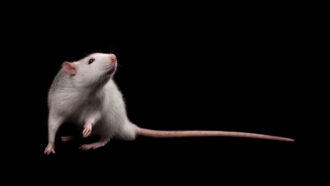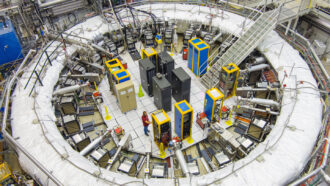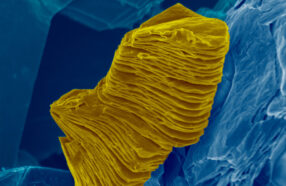All Stories
-
 Physics
PhysicsExperiment: Where does a bouncing basketball’s energy go?
Let’s explore whether energy loss to heat could explain why a basketball doesn’t bounce back to its original height.
-
 Psychology
PsychologyPets and other animals can boost health and well-being
Living with animals seems to provide some health benefits, from lower stress levels to a stronger immune system.
-
 Chemistry
ChemistryPollution power? A new device turns carbon dioxide into fuel
Scientists made a device that converts the greenhouse gas into formate. This salt can then run a fuel cell to make electricity.
By Laura Allen -
 Animals
AnimalsLike tiny Jedis, rats can move digital objects with their brains
Rats imagined their way through a 3-D virtual world in a new study. The results hint at how brains think about places they aren’t physically in.
-
 Tech
TechOffshore wind farms could do far more than just make clean power
Offshore wind farms cost more than onshore ones. But their ability to make ‘green’ hydrogen and capture carbon dioxide could help this wind power pay off.
-
 Life
LifeHas the Endangered Species Act saved species from extinction?
After 50 years, this landmark law has kept many species alive — but few wild populations have recovered enough to come off the “endangered” list.
-
 Brain
BrainBrain scans hint at how well teens will manage pandemic stress
A study that followed hundreds of teens during the COVID-19 pandemic now suggests why some of them handled long-term stress better than others.
-
 Tech
TechLet’s learn about flying drones for science
Airborne robots help researchers keep tabs on wildlife, agriculture and more.
-
 Physics
PhysicsScientists Say: Muon
Tracking muons raining down on Earth can reveal new details of pyramids, volcanoes and thunderstorms.
-
 Planets
PlanetsJupiter has a never-before-seen jet stream — and it’s speedy
Spotted in images from the James Webb telescope, the high-altitude current may help untangle the workings of the giant planet’s atmosphere.
-
 Environment
EnvironmentNew ultrathin materials can pull climate-warming CO2 from the air
To slow global warming, we’ll need help from CO2-trapping materials. Enter MXenes. They’re strong and reactive — and they love to eat up CO2.
By Shi En Kim -
 Ecosystems
EcosystemsRestoring giant underwater forests, one blade at a time
Giant kelp are at risk due to climate change and human activities. In New Zealand, a community effort is rebuilding these underwater algal forests.